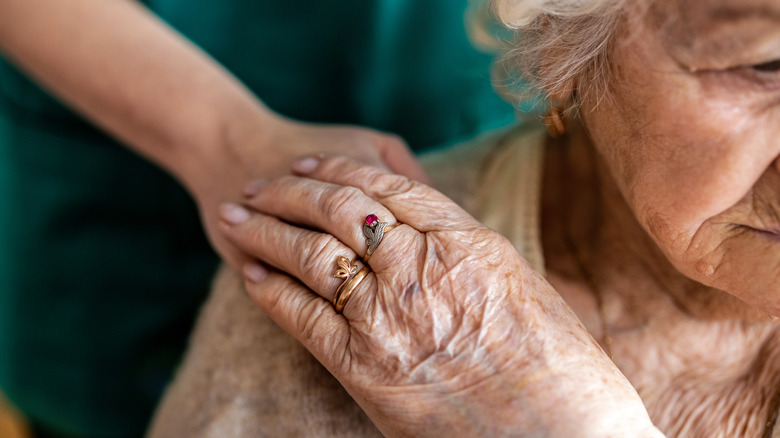How To Identify The Different Stages Of Dementia
Dementia is a term used to describe various symptoms of cognitive decline rather than a specific condition (via WebMD). It is most common in older individuals and usually leads to the need for assisted living care. The most common cause of dementia is Alzheimer's Disease, but there are dozens of other potential causes. While many symptoms of dementia can be treated, many of the diseases that cause it have no cure. Managing dementia often comes down to managing the symptoms of the various stages of the condition.
Dementia can be categorized into seven stages. During the first stage, a person may show no visible symptoms but may test positive for a disease that increases their risk of developing dementia. During stage two, someone will begin to experience small changes in behavior and during stage three they may begin to have issues with memory. During stages four and five, their memory and cognitive thinking skills will continue to decline until they begin needing assistance will daily tasks like picking out clothes and preparing meals. During stage six, someone with dementia will experience severe memory loss and will need help with many daily functions, like going to the bathroom and eating. Once a person reaches stage seven, they will need full-time care and will likely not be able to speak coherently or walk.
Caring for someone with dementia
Dementia is a complicated illness that can cause confusion, disorientation, memory loss, and mood swings. Facing the disease for the first time when a loved one is diagnosed can feel overwhelming, but the more you know about dementia, the better you will be able to empathize with and take care of the person who has it (via Alzheimers.gov). If a loved one has been diagnosed with dementia, take some time to research the condition.
The most common symptom of dementia is memory loss, which can make even simple tasks frustrating and confusing for the person with the disease. Developing a regular routine for the person with dementia will make these tasks more manageable and can lower negative reactions like anxiety and agitation. Be patient and empathetic as your loved one begins to exhibit symptoms. Mood swings and angry outbursts are likely involuntary and do not affect how that person feels about you. They will recognize your love and do their best to reciprocate it.


